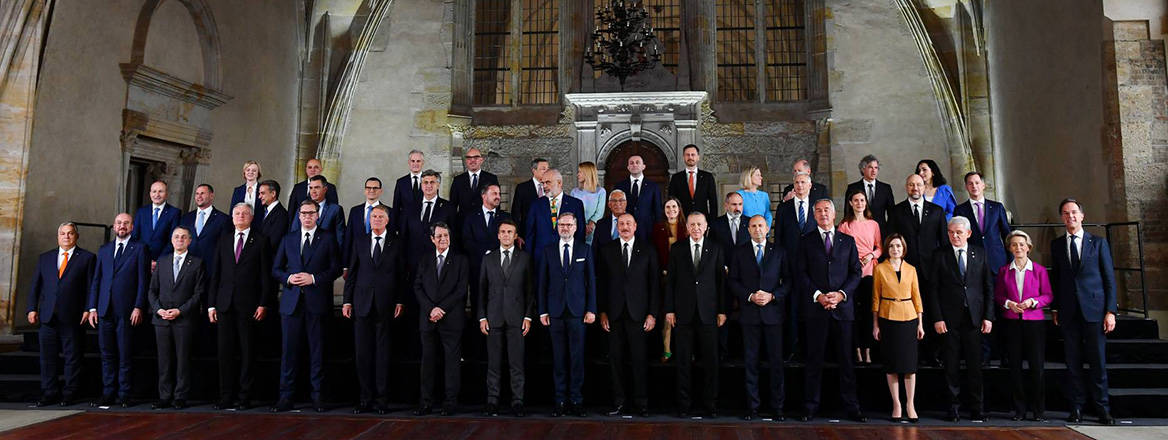With Russia’s regional role predicted to decline following likely defeat in Ukraine, there is an imperative for Europe to fill the vacuum and to fashion a new regional engagement to help ensure the future security and stability of Eurasia.
President Vladimir Putin’s speech on 30 September annexing four territories in Ukraine made clear – if there was anyone left to convince – that Russia is now fully invested in a nationalist and expansionist agenda towards its neighbours. Beyond the celebrations in Moscow that accompanied Putin’s pronouncements, the reality of Russia’s post-Soviet security role is being decided on the battlefields of Ukraine. Here, Russia is losing the war and facing the increasingly likely prospect that it will be unable to achieve even its limited goals and suffer defeat as a result.
Whatever the exact agreement to end the war, Ukraine will emerge from the conflict as a significant military power with substantial battle-hardened armed forces that possess large amounts of advanced NATO standard equipment. With future support from Western countries, Ukraine will likely further develop its air force and Black Sea naval capabilities – alongside its land warfare capacities – and its military will be closely interconnected with the enhanced NATO regional forces in Central Europe and the Black Sea. Even if not a member of NATO, Kyiv will be a cornerstone of transatlantic security in Eastern Europe and the Black Sea. Ukraine will thus emerge from the war as the regional pivot for efforts to contain Russia.
Significantly weakened by the war in Ukraine, Russia will face a new regional situation. In fact, even before the war against Ukraine, Moscow’s regional security role had been weakening. While the Russian elite has adopted an increasingly expansionist role in Eurasia, and the country has extensive regional security commitments – as well as supporting an archipelago of Russian-oriented proxy territories (Abkhazia, South Ossetia, Transnistria and those in Ukraine) – it has faced pressure on its capacities and growing regional competition from Turkey and China, among others. The war has only accelerated these trends and promoted a destabilisation of Eurasia that Russia has been unable to manage.
Russia’s Dwindling Regional Influence
Over the past three decades, Russia has asserted a regional droit de regard across the former Soviet territories based on its claim to serve as a regional gendarme, policing violent instability and conflict and building the Collective Security Treaty Organisation (CSTO) to manage security relations. This role was on display in January 2022, when Russia deployed military forces to Kazakhstan to help stabilise the country following a violent insurrection. Russia’s capacity to perform this role has, however, been significantly undermined by the Ukraine war.
As the war has dragged on, Russia has been forced to withdraw troops from its garrisons in Tajikistan and Kyrgyzstan in Central Asia; from Armenia, including its peacekeeping forces in the Nagorno-Karabakh region; and from Georgia in the South Caucasus. The pressure on these forces will only intensify as the Ukraine war continues, causing further overstretch. When major border clashes erupted between Kyrgyzstan and Tajikistan in September, leading to dozens of deaths and thousands of displaced persons, Russia could do little to respond.
It is, however, in the South Caucasus that the impact of Russia’s diminished regional security role has been most apparent. With its war to reclaim the Karabakh region in 2020 and subsequent violent clashes – the most recent leading to hundreds of deaths – Azerbaijan has seized the opportunity of Russia’s distraction in Ukraine to seek to remake the South Caucasus regional order. In the face of Baku’s coercive diplomacy, Russia was only able to offer an investigative committee in response to Armenian calls for CSTO intervention, drawing the whole purpose of the organisation into question.
With a weakened Russia unlikely to intervene as it has in the past, existing conflicts may reignite, and others are likely to emerge
As Russia is pulled further into trying to avoid defeat in the war it started with Ukraine, it is increasingly unable to police conflicts in its neighbourhood, with the risk that they are left to burn. This is not only weakening Moscow’s principal claim to have a special regional role, but also undercutting its long-term goal of binding the former Soviet republics to Russia through its own regional organisations and thereby blocking other powers from entering the region.
Even as Russia’s security reach is being reduced, its actions in Ukraine are undermining its legitimacy as Eurasia’s policeman. Russia’s assertiveness towards its neighbours – already signalled by the 2014 invasion of Ukraine – and the growing nationalist rhetoric from its top leadership has caused widespread regional concern. Moscow’s 30 September announcement of the annexation of further Ukrainian territory has caused particular unease, notably in Kazakhstan with its long border with Russia and significant Russian minorities – highlighting how the war is pushing Central Asia away from Russia.
Eurasia’s Security Challenges
A weakening of Russia’s neighbourhood security role will be widely welcomed. While Moscow has framed its regional engagements as peacekeeping, in reality the Kremlin has most often sought to manipulate regional conflicts to its advantage and to bully its neighbours through its security and military strength. Russia has acted to freeze conflicts rather than resolve them, and then induced them to heat up again to achieve its own aims. It has supported and directly controlled the leaderships of breakaway regions in order to put pressure on governments, notably in Georgia, Ukraine and Moldova.
Yet, while Russia has sought to take political advantage of the region’s conflicts, it has not always been the driving force behind the violence. The collapse of the Soviet Union led to the emergence of a variety of significant regional conflicts, including in the North Caucasus within Russia itself. In the subsequent decades, these conflicts have continued to evolve, even if Russian security forces have generally prevented escalation to major violence. Meanwhile, what were once largely localised disputes between armed militias have in several cases transformed into interstate disputes involving modern armed forces with advanced capabilities. Borders across the region are yet to be demarcated in many places and are often disputed, with complex patterns of enclaves and exclaves, while ethnoterritorial disputes – including over diasporas – persist.
With a weakened Russia unlikely to intervene as it has in the past, existing conflicts may reignite, and others are likely to emerge. Unchecked, violence could destabilise key regions, with the risk of escalation and spill-over into neighbouring areas. While significantly reduced by the war in Ukraine, Russia will nevertheless remain a significant regional security actor, capable of manipulating conflicts and acting as a spoiler. Without an effective regional actor to address Eurasia’s conflicts and sensing a power vacuum, others will likely feel that they must act to extend their role in key sub-regions. Even since before the Ukraine war, Turkey and Iran have been looking to enhance their roles in the South Caucasus and Central Asia, while China has built extensive ties and interests across the region.
Managing Eurasia’s Conflicts
With the end of the Cold War, the Organisation for Security and Cooperation in Europe (OSCE) was established to manage security from Vancouver to Vladivostok. During the immediate post-Soviet decades, the OSCE took a leading role in defusing and preventing conflict through its institutions and missions, based on the shared principles of European security. Today, Russia’s actions and position in the OSCE have marginalised the organisation. Its regional role has also been crucially undermined by Eurasian states resistant to the organisation’s focus on democracy, the rule of law and human rights. In the future, the OSCE will not be able to play the key role that it performed in the past.
Europe’s existing security architecture is ill-suited to meeting the challenge of shaping the new security environment emerging on its borders and managing Russia
Other transatlantic institutions are also likely to struggle to be effective in the region, even if Russia’s ability to resist their enlargement and the spread of transatlantic influence is significantly diluted. Unable to offer an effective security role to address the region’s conflicts and to counter Russia’s spoiler activities, the EU has struggled to exert regional influence. Its flagship Eastern Partnership policy has been ineffective. While the EU is now exploring membership options for key regional states – including Ukraine, Moldova and potentially Georgia – the war in Ukraine has demonstrated that unless accompanied by real security guarantees, such efforts will be seen as an invitation for Russia to meddle and promote instability.
The prospects of NATO extending its membership alongside efforts to enlarge the EU into Eastern Europe and Eurasia currently appear dim. While states in Central Europe are ready to see Ukraine become a member, Western European states, and crucially the US, remain cautious about how to handle Russia. President Joe Biden has been clear that the US is not ready to put NATO troops in direct contact with Russian forces in Ukraine, and by extension other contested areas. This suggests that beyond defence and deterrence of the eastern flank and military assistance to partners, the Alliance’s regional security role will also be constrained.
Europe’s Eastern Security Challenge
A key likely outcome of Russia’s defeat in its war against Ukraine will be a reconfiguration of security across Eurasia. Russia’s reach will diminish, although it will retain the ability to manipulate conflicts and to be a spoiler. In this context, there is a risk that suppressed conflicts will restart, and that new ones will emerge, pulling in regional powers.
Now is therefore the moment to look beyond the current war in Ukraine to what will come next in the region. The final peace agreement for the Ukraine war will, after all, be a determinant of Moscow’s wider future regional role. This is an opportunity for Europe to come together to set out a new vision for Eurasia, and to support that vision with substantial and effective engagement in the region’s current and emerging security challenges.
Europe’s existing security architecture is ill-suited to meeting the challenge of shaping the new security environment emerging on its borders and managing Russia. The recent convening of the European Political Community (EPC), however, offers a potential mechanism to begin discussions about wider European security, not least since the next meeting will be hosted by Moldova. With the core purpose of the EPC yet to be clearly defined, it is imperative that ensuring stability and security ‘east of Vienna’ based on the already agreed principles becomes a core task of the grouping.
The views expressed in this Commentary are the author’s, and do not represent those of RUSI or any other institution.
Have an idea for a Commentary you’d like to write for us? Send a short pitch to commentaries@rusi.org and we’ll get back to you if it fits into our research interests. Full guidelines for contributors can be found here.
WRITTEN BY
Dr Neil Melvin
Director, International Security
International Security
- Jim McLeanMedia Relations Manager+44 (0)7917 373 069JimMc@rusi.org


